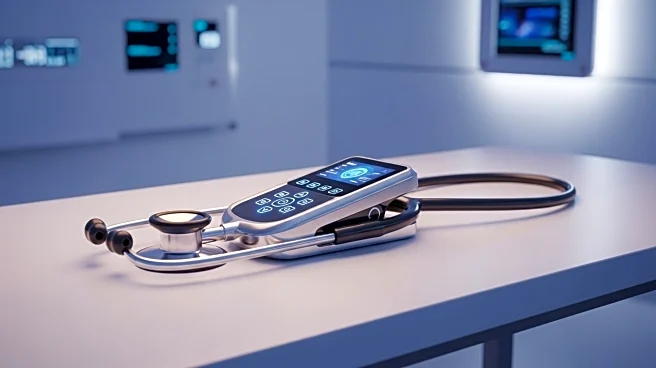What's Happening?
Researchers at Imperial College London and Imperial College Healthcare NHS Trust have unveiled an AI-powered stethoscope capable of diagnosing heart failure, atrial fibrillation, and valvular heart disease in just 15 seconds. This innovative device, which resembles a traditional stethoscope, is equipped with advanced AI and ECG capabilities. It analyzes subtle differences in heartbeat and blood flow that are undetectable to the human ear. The AI stethoscope connects to a smartphone app via Bluetooth, allowing for visualization of captured data. It uses cellular or Wi-Fi connectivity to access cloud-based AI algorithms, which have shown high statistical performance in international validation studies.
Why It's Important?
The AI stethoscope represents a significant advancement in medical diagnostics, potentially transforming the way heart conditions are detected and treated. By enabling rapid diagnosis, it increases the likelihood of early intervention, which can save lives and reduce healthcare costs. The device is particularly beneficial for patients showing symptoms of heart conditions, offering a promising tool for healthcare providers to improve patient outcomes. As AI continues to integrate into healthcare, such innovations could lead to more efficient and accurate diagnostic processes, ultimately enhancing the quality of care.
What's Next?
The AI stethoscope is expected to undergo further trials and evaluations to ensure its efficacy and reliability in diverse clinical settings. As the technology gains traction, healthcare providers may begin adopting it more widely, potentially influencing standard diagnostic practices. Regulatory bodies will likely continue to monitor and assess the device's performance, ensuring compliance with medical standards. The integration of AI in healthcare diagnostics may prompt discussions on ethical considerations and data privacy, as patient information is processed through cloud-based systems.
Beyond the Headlines
The introduction of AI in medical devices like the stethoscope raises important ethical and legal questions regarding data privacy and the role of AI in healthcare decision-making. As AI algorithms become more prevalent, there is a need to address how these technologies impact patient trust and the doctor-patient relationship. Additionally, the reliance on cloud-based systems for data analysis necessitates robust cybersecurity measures to protect sensitive health information.








